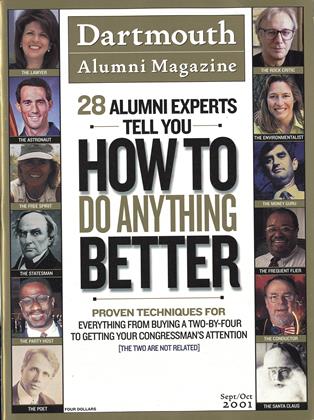TV SITCOM EXECUTIVE
There are two general paths that the aspiring comedy writer (read: person who has failed to cultivate any skill other than his natural sense of pith/ironic detachment) can follow to achieve success.
PATH I: This delightful technique takes advantage of your very troubled childhood, alienation from family and undercurrent of seething hostility. Qualifications: You've ideally grown up sleeping in a coat closet, all of your dreams and selfworth have been drummed out of you by your sixth birthday and you're incapable of maintaining a relationship. You are what psychologists term a "stand-up comedian." The good news is, when you get around to writing, your humor will be raw and real and often brilliant. Then you'll be able to afford therapy.
PATH 2: Be relatively happy, relatively neurotic, relatively funny and Ivy League-educated. In comedy writing, the Ivy graduate will find that doors fling wide open, carpets roll out and the job offers come aknockin'. There's only one catch: Your Ivy League diploma should read "Harvard." So if you're still an undergraduate, consider transfering or refocusing your efforts on something Dartmouth churns out expertly, such as musicologists or bankers or people who know how to pick out two-by-fours.
Of course, you can become successful just by writing funny things consistently, but that's way too hard to be worth it. But before you choose your path, ask yourself, "Why do I want to be a comedy writer?" Whatever your answer is, criticize your- self relentlessly until you cry. Then take the MCATS.
Venokur, a former MTV writer,served as executive producer ofNBC's Third Rock From the Sun forfive years. He's now working on adevelopment project that could becomea new television show. He majored in English.
 View Full Issue
View Full Issue
More From This Issue
-
 Cover Story
Cover StoryHOW TO MAKE AN AWARD-WINNING DESSERT
September | October 2001 By ERIKA SIMEON '92 -
 Cover Story
Cover StoryHow to Get to Outer Space
September | October 2001 By JIM NEWMAN ’78 -
 Cover Story
Cover StoryHOW TO WIN AN EASY BUCK WITH A CARD TRICK
September | October 2001 By MICHAEL ELLIS '39 -
 Cover Story
Cover StoryHOW TO STOP HATING CLASSICAL MUSIC
September | October 2001 By ERICH KUNZEL JR. '57 -
 Cover Story
Cover StoryHOW TO CHOOSE A LAWYER
September | October 2001 By BARBARA MURPHY '79 -
 Cover Story
Cover StoryHOW TO QUIT YOUR JOB AND HIT THE OPEN ROAD (IN A MOTOR HOME)
September | October 2001 By MARIANNE McCARROLL 84
Features
-
 Feature
FeatureSargeant Heads Alumni Council
JULY 1968 -
 Feature
FeatureSEASON'S GREENING
December 1989 -
 Feature
FeatureWebster in the Raw
NOVEMBER 1999 -
 Feature
FeatureDARTMOUTH IN THE PEACE CORPS
MAY 1963 By Clifford L. Jordan Jr. '45 -
 Cover Story
Cover StoryHOW TO MAKE AN AWARD-WINNING DESSERT
Sept/Oct 2001 By ERIKA SIMEON '92 -
 COVER STORY
COVER STORYFor Love of the Game
Sept/Oct 2008 By Jennifer Wulff ’96

